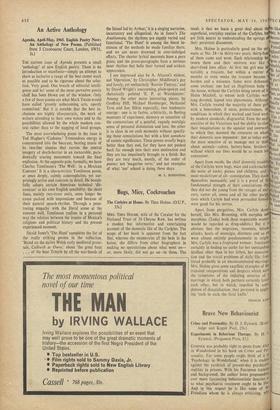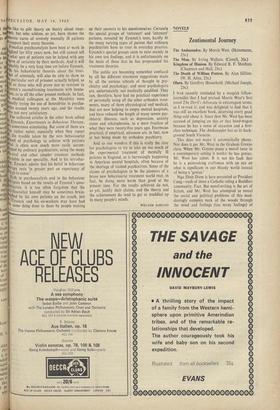Brave New Behaviourist
Crime and Personality. By H. J. Eysenck. (Rout' ledge and Kegan Paul, 25s.)
Experiments in Behaviour Therapy. By H. 1. Eysenck. (Pergamon Press, £5.) EYSENCK was probably right to quote from Alia in Wonderland in his book on Crime and Po sonality. For some people might think of it as, `Psychology in Wonderland,' when it is studieui against the yardstick of present-day psychiatric realities in prisons. With his European trainiq and background, the author loves propounding, ever more fascinating behaviouristic theories 3' to what psychiatric treatment ought to be And in this respect he is like some of th' Freudians whom he is always criticising, WWI"° Iso like to pile theory on theory about treat- tat; but who seldom, as yet, have shown the acrete cures of severely mentally ill patients support their many theories. Freudian psychoanalysts have been a, work in $gland for fifty years now, but still cannot tell what sort of patients can be helped with any gree of certainty by their methods. And it will lobably be a very long time yet before Eysenck, ith his behaviourist theories about the treat- ent of criminals, will also be able to show us particular sort of prisoner actually helped, as 'ell as those who will prove just as resistant to Ysenck's reconditioning treatments with benze- ne, as to all the other present methods. In fact, le medical colleagues at the Mpudsley were lually trying the use of benzedrine in psycho- ths around twenty years ago, and the results ere not very satisfactory. The collected articles in the other book edited Eysenck, Experiments in Behaviour Therapy, re sometimes stimulating. But some of them are Ls9 rather naïve; especially when they report $ the trouble taken by the new behaviourist hoot of psychology to achieve with patients hat is often now much more easily accom- $shed by ordinary psychiatrists, using the many Ysical and other simpler treament methods Yailable in our speciality. And in his introduc- n, Eysenck admits that his belief in behaviour !TAM/ rests 'in greater part on expectancy of th gs to come.'
00th in psychoanalysis and in the behaviour erapies based on the results of Eysenck's ques- hnaires, it is too often forgotten that the Ychoanalyst himself may be sometimes brain- ed by his own patients on the couch, just Ysenck and his co-workers may have had same thing done to them by people making up their answers to his questionnaires. Certainly the special groups of 'extrovert' and 'introvert' patients, revealed by Eysenck's tests, hardly fit the many varying types of patient that ordinary psychiatrists have to treat in everyday practice. Eysenck's special groups seem to exist mainly in his own test findings, and it is unfortunately on the basis of these that he has propounded his treatment theories.
The public are becoming somewhat confused by all the different treatment suggestions made by all the various schools of thought in psy- chiatry and psychology; and most psychologists are, unfortunately, not medically qualified. They can, therefore, have had no practical experience of personally using all the other orthodox treat- ments, many of them physiological and medical, that are now helping to empty mental hospitals, and have reduced the length of many severe psy- chiatric illnesses, such as depression, anxiety states and schizophrenia, to a mere fraction of what they were twenty-five years ago. Enormous practical, if empirical, advances are, in fact, now at last being made by orthodox psychiatry.
And so one wonders if this is really the time for psychologists to try to take on too much of the experimental treatment of mentally ill patients in England, as is increasingly happening in American mental hospitals, often because of the sheirtage of trained psychiatrists. Some of the claims of psychologists to be the pioneers of a brave new behaviourist treatment world may, in fact, be doing more harm than good at the present time. For the results achieved do not, as yet, justify their claims, and the theory and the achievement do tend to get so muddled up in many people's minds.
WILLIAM SARGANT



































 Previous page
Previous page